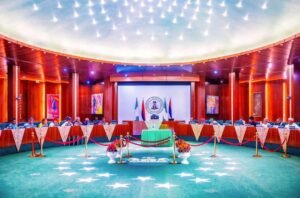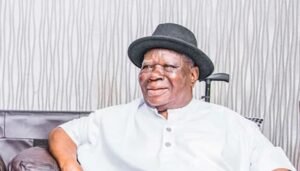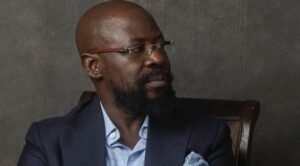Renowned economist and political thinker Professor Pat Utomi on Monday announced the formation of what he described as a “shadow government” to offer alternative policies and hold President Bola Tinubu’s administration accountable. It already and clearly sent shock waves in all government quarters, particularly, the ruling party-APC, as this is being perceived as a parallel government. Amid Nigeria’s economic and political challenges, this move marks a shift in opposition politics. Korede Abdullah of Africa Health Report examines its potential impact on democracy, governance, and public trust.
Shadow Government: A Bold Move

FEC Making Desperate Moves to Counter Utomi’s Big Tent
In a bold move that signals both desperation and determination, the economist and political activist, Professor Pat Utomi has launched a shadow government aimed at providing a counterforce to President Bola Tinubu’s administration.
This initiative, dubbed the “Big Tent Coalition Shadow Government,” emerges at a time when Nigeria’s political landscape is increasingly fragmented, raising questions about the efficacy of its democracy and the role of opposition parties.
A National Emergency Response
The virtual launch of the shadow government on Monday was framed by Utomi as a “national emergency response” to the perceived failures of the current administration.
Drawing members from various opposition parties, the coalition aims to scrutinize government actions, identify policy failures, and propose viable alternatives in critical sectors such as the economy, education, healthcare, and security.
Utomi articulated the urgency of this initiative, stating, “The recent spate of defections to the All Progressives Congress provides further evidence that all is not well with democracy in Nigeria.”
He emphasized that a genuine opposition must not only critique the government but also propose solutions to avoid complicity in the erosion of democratic principles.
The Shadow Government’s Objectives
The shadow government, which will convene weekly, is designed to serve as both a think tank and a policy watchdog. Utomi underscored the importance of integrity and transparency in governance, qualities he claims are lacking under the current regime.
“Nothing is more urgent than tackling the rising poverty across the country,” he lamented, pointing to the closure of multinational companies and the soaring unemployment rates as indicators of poor governance.
On security reform, Utomi proposed a decentralized approach to policing, advocating for community empowerment in maintaining local security.
“Policing for me is a local function,” he asserted, suggesting that a layered security structure involving local forces, state police, and a Federal National Guard could enhance safety and accountability.
Farotimi Heads Ombudsman
Human rights lawyer Dele Farotimi has been appointed to head the Ombudsman and Good Governance portfolio in a newly formed shadow government opposing President Ahmed Bola Tinubu’s administration. Farotimi will work alongside key figures in the policy delivery unit, including Oghene Momoh, Cheta Nwanze, Daniel Ikuonobe, Halima Ahmed, David Okonkwo, and Obi Ajuga.
The broader shadow cabinet features a diverse mix of professionals and policy experts such as Dr Adefolusade Adebayo, Dr Peter Agadah, Dr Sadiq Gombe, Chibuzor Nwachukwu, Salvation Alibor, Bilkisu Magoro, Dr Victor Tubo, Charles Odibo, Dr Otive Igbuzor, Eunice Atuejide, Gbenga Ajayi, Dr Mani Ahmad, Peter Oyewole, and Dr Omano Edigheji.
Other appointees include Sidi Ali, Ibrahim Abdukarim, Adenike Oriola, Promise Adewusi, Prof. Ukachukwu Awuzie, Ambrose Obimma, Rwang Pam, Dr Kingsley Anedo, Prof. Auwal Aliyu, Dr Ghazali Ado, Nana Kazaure, Aisha Yusuf, Dr Charles Gilbert, and Olujimi Akiboh.
Government’s Pushback
The formation of the shadow government has not been without controversy. In a swift rebuttal, the Federal Government condemned the initiative, labeling it an aberration within Nigeria’s federal system.
Minister of Information and National Orientation, Mohammed Idris, on Wednesday stated, “This idea of a shadow government sadly does not pass that test,” highlighting that the country’s parliamentary system already accommodates opposition voices through its bicameral legislature.
Idris emphasized that while opposition politics is crucial, it must adhere to established norms and practices. His comments reflect a broader concern regarding the legitimacy of the shadow government and its potential impact on Nigeria’s political landscape.
Erosion of Opposition Strength
The backdrop of Utomi’s announcement is marked by a troubling trend of defections from opposition parties to the ruling APC, raising alarms about the viability of opposition forces in Nigeria.
Recent events have seen significant figures from the Peoples Democratic Party (PDP) and Labour Party abandoning their parties, further consolidating power within the ruling coalition.
This mass exodus poses critical questions about the health of Nigeria’s democracy which some political analysts say is sliding into one a one party state. As opposition strength wanes, so too does the capacity for effective checks and balances on the ruling party.
Some analysts who spoke with our correspondent shared their insights on the implications of mass defections to the ruling party.
Dr. Murtala Oluwadare, Political Scientist said the wave of defections from the PDP and Labour Party to the APC highlights a troubling trend in Nigeria’s political landscape. The scholar said it suggests a lack of cohesive strategy within the opposition parties to retain their members.
“The APC’s ability to attract these individuals often indicates not just political ambition but also the allure of power and resources that come with being part of the ruling party. For the opposition to regain strength, they must focus on unifying their base and offering a compelling alternative to the APC’s policies.”, Dr. Ouwadare noted.
He added that the trend of political realignments, often motivated by personal or strategic gain, threatens to create a democratic deficit—one where accountability, representation, and public trust in political institutions become increasingly compromised.
“The migration of key figures from the PDP and Labour Party to the APC is indicative of a broader issue within Nigeria’s political culture—where allegiance often shifts based on personal gain rather than ideological commitment.”, he explained.
Dr. Ouwadare lamented that the erosion of opposition strength is concerning for Nigeria’s democracy. He added that it reflects a scenario where the ruling party consolidates power, leaving little room for dissenting voices
“The APC’s strategy of attracting opposition members may be effective in the short term, but it poses long-term risks, including reduced political competition and innovation. The opposition parties need to cultivate loyalty through clear, principled leadership and a shared vision for the country.”, he concluded.
Jonathan Cautions Against One-Party State
Also, former President Goodluck Jonathan has cautioned against any political maneuvering aimed at imposing a one-party system in Nigeria, warning it could suffocate democracy and plunge the country into confusion and anarchy.
Chief Edwin Clark on Political Diversity

Speaking in Abuja on Wednesday at a memorial lecture for late South-South leader and former federal commissioner for information, Chief Edwin Clark, Jonathan emphasized the importance of political diversity and warned that the recent wave of defections to the ruling All Progressives Congress (APC) poses a serious threat to multiparty democracy.
Jonathan acknowledged that a one-party system has worked in other contexts, such as in Tanzania under Julius Nyerere, where it was introduced through consensus to foster unity among a diverse population.
However, he stressed that such a system must emerge through deliberate and transparent processes, not political manipulation or coercion. He warned that forcing a one-party reality could destabilize the nation.
A Call for Reflection and Action
The emergence of the shadow government is both a response to and a reflection of the challenges facing Nigeria’s democracy.
As Professor Utomi aptly pointed out, “If a genuine opposition does not courageously identify the performance failures of incumbents, offer options, and influence culture in a counter direction, it will be complicit in subverting the will of the people.”
As Nigeria grapples with these developments, analysts say it is imperative for political leaders, civil society, and the electorate to reflect on the importance of a robust opposition.
Emergence of Parallel Government
Also speaking with Africa Health Report (AHR), a public affairs analyst, Alhaji Ibrahim Yusuf, cautioned that the emergence of a parallel government in Nigeria, often masked as a shadow government, poses a significant threat to the nation’s democratic integrity.
According to him, such a movement undermines established political institutions, fosters division, and can lead to increased instability by creating competing power structures that challenge the legitimacy of elected officials.
“In my own view, this situation not only erodes public trust in governance but also risks inciting conflict among various factions, ultimately jeopardizing the democratic process and the rule of law.”, Alhaji Yusuf said.
Strengthening democratic institutions and practices will be crucial in ensuring that diverse voices are heard in policymaking and that the government remains accountable to the people it serves.
The question remains: will the shadow government galvanize a renewed commitment to democratic principles, or will it further complicate an already tumultuous political landscape? Time will tell.
Faces of Strong Non-Politicians Resolute to Wrest Power with Tinubu
As the ruling APC makes desperate moves to counter the emerging forces of Professor Pat Utomi’s Big Tent, described as a “Shadow Government” Hussaini Ibrahim profile the men in the ‘shadow’.
As Nigeria’s political terrain braces for another wave of realignments ahead of the 2027 general elections, renowned political economist, Professor Pat Utomi, has introduced a new political construct that is stirring national debate.
Under the banner The Big Tent, Utomi has assembled a coalition of Nigerians—many with radical and reformist credentials—who aim to operate what he calls a “shadow government.” Inspired by Westminster-style political oversight, the initiative does not intend to contest elections immediately. Instead, it seeks to provide alternative policy proposals, serve as a watchdog over current governance, and deepen civic engagement.
To make sense of this bold initiative, AHR spoke with two political analysts—Dr. Rukaiya Abdullahi from Kano and Mr. Kayode Akinlaja from Bauchi.
Farotimi Heads Ombudsman

Human rights lawyer Dele Farotimi has been appointed to head the Ombudsman and Good Governance portfolio in a newly formed shadow government opposing President Ahmed Bola Tinubu’s administration. Farotimi will work alongside key figures in the policy delivery unit, including Oghene Momoh, Cheta Nwanze, Daniel Ikuonobe, Halima Ahmed, David Okonkwo, and Obi Ajuga.
Prof. Ukachukwu Awuzie, Ambrose Obimma, Rwang Pam, Dr Kingsley Anedo, Prof. Auwal Aliyu, Dr Ghazali Ado, Nana Kazaure, Aisha Yusuf, Dr Charles Gilbert, and Olujimi Akiboh.
A Counterbalance Long Overdue – Dr. Rukaiya Abdullahi
Dr. Abdullahi described the development as a welcome disruption in Nigeria’s political space. Speaking in an interview with AHR, she said the Big Tent should not be dismissed as just another gathering of disillusioned voices. According to her, “It is a deliberate and calculated political move.”
She explained that Professor Utomi’s approach introduces a style of governance that Nigeria has long overlooked—participatory shadow governance. In her view, such a platform could inspire policy innovation, revive civic consciousness, and nurture credible alternative leadership, particularly among youths and professionals sidelined by conventional party politics.
“The concept of a shadow government,” she emphasized, “is not alien to functioning democracies. In the United Kingdom, for example, it strengthens opposition voices and holds ruling parties accountable.” She added that if implemented with discipline and sincerity, the Big Tent could redefine opposition politics in Nigeria by setting new standards for transparency and public accountability.
However, the Kano-based analyst struck a note of caution. She acknowledged that public trust in alternative political movements has waned due to past disappointments. “Nigerians have seen several so-called ‘third forces’ come and go. If the Big Tent wants to succeed, it must break away from elite echo chambers and establish relevance among the grassroots, where the real political contest is fought.”
Another Cocktail of Idealists? – Kayode Akinlaja
While Dr. Abdullahi saw potential in the initiative, Mr. Kayode Akinlaja from Bauchi adopted a more skeptical stance.
Speaking to AHR, Akinlaja dismissed the shadow government as “political theatre” that may never translate into serious electoral machinery.
“We’ve seen this movie before,” he said. “Utomi is a respected intellectual, no doubt. But Nigerian politics isn’t moved by brilliance alone. It thrives on structure, numbers, and ground-level mobilization.” He warned that unless the movement builds actual political strength, it risks ending up as “another NGO masquerading as a political force.”
Akinlaja also raised concerns about ideological coherence within the coalition. According to him, many of the individuals under the Big Tent banner may be radical in theory but lack a unified approach. “It’s one thing to unite around discontent; it’s another to present a coherent policy alternative that resonates with the average Nigerian—especially those in rural Sokoto or Aba.”
Despite his reservations, Akinlaja admitted that the initiative could at least stir meaningful dialogue. “At the very least, Utomi is shaking the table,” he said. “That’s a valuable contribution. But for now, it feels more like a moral campaign than a political machine.”



